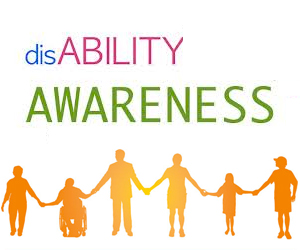
Parents and teachers can model acceptance and understanding through education and sensitivity.
One in five Americans has a disability of one form or another. SPECIAL NEEDS is a broad umbrella underneath which a large array of diagnoses can be wedged. There are many children in our schools with special needs we are not even aware of and others that stand out because of behaviors or physical limitations. Children with special needs may have mild learning disabilities or profound intellectual disabilities; food allergies or terminal illness; developmental delays that catch up quickly or remain entrenched; occasional panic attacks or serious psychiatric problems.
Many children are born with their disability and do not deserve the negative attention and rude comments they often receive from their peers. Parents and teachers can model acceptance and understanding through education and sensitivity. When we teach children about disabilities and differences at a young age, our hope is that they will be accepting of others with special needs in school and in their community.
Our children need to learn People First Language which means putting the person before the disability. For example, we would not say disabled child, but rather a child with a disability. Using people first language helps others to remember that people are first and their special needs are secondary. Words such as lame, retarded, or psycho are not respectful, even if used when just joking around.
There is a national campaign to eliminate the use of the R Word [retard] from the English language. The R-word hurts because it is exclusive. Its offensive. Its derogatory.
What is age appropriate? Parents of 3 to 5 year olds may teach that everyone is different, but we all have similarities as well. We may teach the young child that everyone has something special about us. Five to 7 year olds tend to ask more disability-specific questions. They may benefit from story books about children with special needs. Children who are older may benefit from learning how they can help children be included and participate in activities. Friendship and respect usually come naturally, but sometimes need to be taught.
FIND LOCAL SPECIAL NEEDS RESOURCES & CLASSES >
[AUTHOR: Ability awareness resources, books and activities are available to help parents, teachers, and caregivers. Alpha Resource Center of Santa Barbara can provide support, information, and tools to help promote and celebrate ability awareness. www.alphasb.org.]
March 25, 2015pcaja
RELATED CHATS
 Time-Management Tips for Working Parents: Double duty can ruin your work-life balance. Working parents, tame time pressures with these strategies.
Time-Management Tips for Working Parents: Double duty can ruin your work-life balance. Working parents, tame time pressures with these strategies. Summer Camps and Activity Guide 2018
Summer Camps and Activity Guide 2018 Kids helping kids impacted by Montecito disaster
Kids helping kids impacted by Montecito disaster
Parents and teachers can model acceptance and understanding through education and sensitivity.
One in five Americans has a disability of one form or another. SPECIAL NEEDS is a broad umbrella underneath which a large array of diagnoses can be wedged. There are many children in our schools with special needs we are not even aware of and others that stand out because of behaviors or physical limitations. Children with special needs may have mild learning disabilities or profound intellectual disabilities; food allergies or terminal illness; developmental delays that catch up quickly or remain entrenched; occasional panic attacks or serious psychiatric problems.
Many children are born with their disability and do not deserve the negative attention and rude comments they often receive from their peers. Parents and teachers can model acceptance and understanding through education and sensitivity. When we teach children about disabilities and differences at a young age, our hope is that they will be accepting of others with special needs in school and in their community.
Our children need to learn People First Language which means putting the person before the disability. For example, we would not say disabled child, but rather a child with a disability. Using people first language helps others to remember that people are first and their special needs are secondary. Words such as lame, retarded, or psycho are not respectful, even if used when just joking around.
There is a national campaign to eliminate the use of the R Word [retard] from the English language. The R-word hurts because it is exclusive. Its offensive. Its derogatory.
What is age appropriate? Parents of 3 to 5 year olds may teach that everyone is different, but we all have similarities as well. We may teach the young child that everyone has something special about us. Five to 7 year olds tend to ask more disability-specific questions. They may benefit from story books about children with special needs. Children who are older may benefit from learning how they can help children be included and participate in activities. Friendship and respect usually come naturally, but sometimes need to be taught.
FIND LOCAL SPECIAL NEEDS RESOURCES & CLASSES >
[AUTHOR: Ability awareness resources, books and activities are available to help parents, teachers, and caregivers. Alpha Resource Center of Santa Barbara can provide support, information, and tools to help promote and celebrate ability awareness. www.alphasb.org.]
Category: Parenting 0-4 Parenting 5-12 Parenting teens Special needs





Rachael, thank you for this thoughtful article. I would just like to add that with our child we have experienced very little name calling, yet the exclusion and isolation are equally as painful. In the spirit of parents teaching everyone is different, I would encourage parents to take it one step further and help their children develop effective strategies for including, rather than avoiding, the child who is different. For parents who are not confident about developing such a strategy, your childs teacher can be a great resource. Thank you.
Thank you so much for this article. Im a frequent presenter at local schools on (dis)Ability Awareness day. I choose to put the dis in parentheses because I prefer to spread the message that were all unique and we all have Abilities that make us stand out in wonderful ways. Im happy to report that my experience with students at all levels in Santa Barbara has been very positive. In fact, I often say that its probably the adults in the room that Im really talking too because the kids really get it. Society is evolving and people with (dis)Abilities are a part of the community and need to be included.
Thank you for mentioning the R word campaign and People First Language. I am also the mother of Theo, a 12 year old boy. He has beautiful blue eyes, a smile that lights up a room and gives the best hugs and he also has a disability. But hes Theo first!
Your article is well timed. Im off to another school today to spread awareness. I also work at the Alpha Resource Center and would be happy to share our resources and books with those who are wanting to learn more. The wonderful world of people with (dis)Abilities is not a sad, pitiful place. If you want to learn more schedule a tour of The Alpha Resource Center or visit our art gallery, Slingshot, and meet the artists who are creating beautiful masterpieces. Or come to Kyles Kitchen in Goleta on Saturday and support Alpha and view more of the art work.
Thanks again for spreading awareness of a community that wed all benefit from getting to know.
I read a wonderful book with my tween daughter called Out of My Mind. It is about an eleven-year-old girl with cerebral palsy. It touched on so many issues around tolerance, understanding and respect. It reminded us of how easily we can judge others without really knowing them.